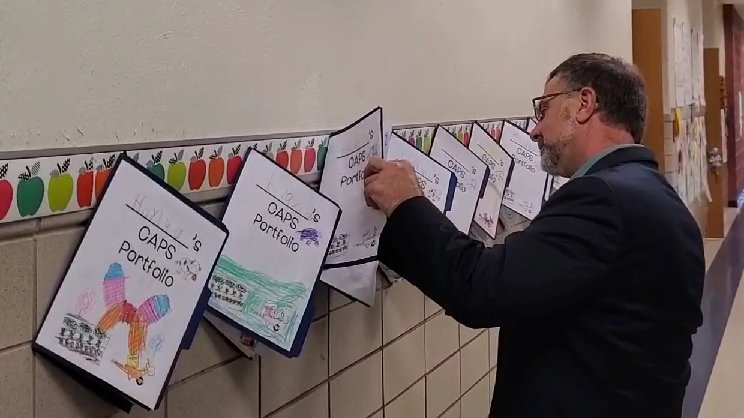Captivating Students for Agriculture – Community Agricultural Partnership at Summit (CAPS)
by Charlene Shupp Espenshade, Friends of Ag Foundation Executive Director
This past school year looked a little different at Summit Elementary School in Butler County. The school had a new name, Community Agricultural Partnership at Summit – CAPS for short, and a new mission. The school was committed to infusing agricultural education across all grades.
“We’re going to cultivate lifelong learners and support and inform citizens with respect and appreciation for conservation, agriculture and the outdoor environment,” Chad Browman, CAPS principal. We’re going to utilize outdoor learning spaces as a regular part of classroom activities in all seasons. We’re going to work with the School Community Advisory Team to develop training, planning, scheduling for implementing ag focused activities and experiences.
CAPS is a part of the Butler Area School District. Each of the elementary schools was tasked to expand the learning experience with a specialty focus. With the 16 acres surrounding the school and the initial impacts the administration saw in the 2019-2020 school year as Angela Eyth implemented agricultural lessons into her classroom an idea began to take root. What if this elementary school took on an agricultural mission?
Eyth attended the Pennsylvania Friends of Agriculture Foundation’s Educator’s Ag Institute in 2019. The principal at the time encouraged her to take the time to attend the five-day training. Eyth agreed but wondered what she could gain to bring back to her classroom. She quickly discovered during that conference that agriculture would re-inspire and reinvigorate her passion for teaching.
Eyth said she was rather overwhelmed at where to begin adding agriculture into her classroom, but she soon realized that the farm community was ready to provide an assist. She contacted her local 4-H Educator to brainstorm ideas and attended the Butler County Farm Bureau fall meeting starting to make connections. That first year, she developed monthly agricultural themes, invited in guest speakers and the students started to expand their horizons.
Fast forward to 2021 – the administration decided to expand the impact. But they needed community buy in. They put together a steering committee including teachers, PTO members and community leaders to build the vision.
Together they have created a thee year plan for the outdoor spaces planting fruit trees, building outdoor classroom space, adding bee hives and so much more. Inside the school, teachers designed ag journaling, ag careers, animal and plant units. They did units on animal life cycles, watched tadpoles turn into frogs, hatched chicks, and installed a hydroponic lettuce growing system.
Eyth said it’s been amazing to see the growth with the students. In the school’s garden the kids discovered something was eating the kale. They wanted to do something about it. The kids were tasked to design a system to deter the animals. They developed their ideas and shared it with the class. The kids then selected a couple to try. They then constructed them and observed the results.
“None of this was in my curriculum,” she said. “What was great this year is the kids would have ideas and we would run with it. I think what is great is these kids are problem solvers, inventors, and creators and look at these things with different eyes.” The students are taking a deeper look into the how and why of the problem.
As a math teacher she uses the garden as a way to introduce students to area and perimeter. She’s adopted a calf for the classroom. Her grade hatched chicks to show the life cycle. And this is only the beginning.
In May, Foundation chairman Rick Ebert and Pennsylvania Farm Bureau board member William Thiele toured the school and observed the project progress.
“Just seeing the projects the kids have done, I can see the excitement they have when they do these projects. Its so hands on, its more than just sitting in a classroom … The amount of brainpower these kids are developing is amazing,” sad Ebert, who is also president of the Pennsylvania Farm Bureau.
Ebert said this is an example of what can happen after a teacher attends Educator’s Ag Institute. Many teachers might not have a personal connection to farming or the opportunities to add agriculture to their curriculum. Ag Institute provides them with resources and connections to people to can assist. “Teachers are always struggling to find new material and ways to excite their kids. When they come to institute, they go home with support they might not have otherwise.”
Eyth said the community has rallied around this program. When she has visited with the Butler County Farm Bureau fall meeting in 2019, farmers kept visiting saying let me know how I can help. Thiele said its important for Farm Bureaus to support teachers aspiring to teach agriculture.
“It is awesome to have a school like this, just miles from my farm,” Thiele said. “What they are doing here is impressive.” County Farm Bureaus have a role to play. “Our kids are our future, we need to have them learn about what we are doing and about agriculture. … We would not be here without farmers, everyone needs to learn about it.”
Editor’s note: To learn more, here is a video about the education efforts at CAPS.

